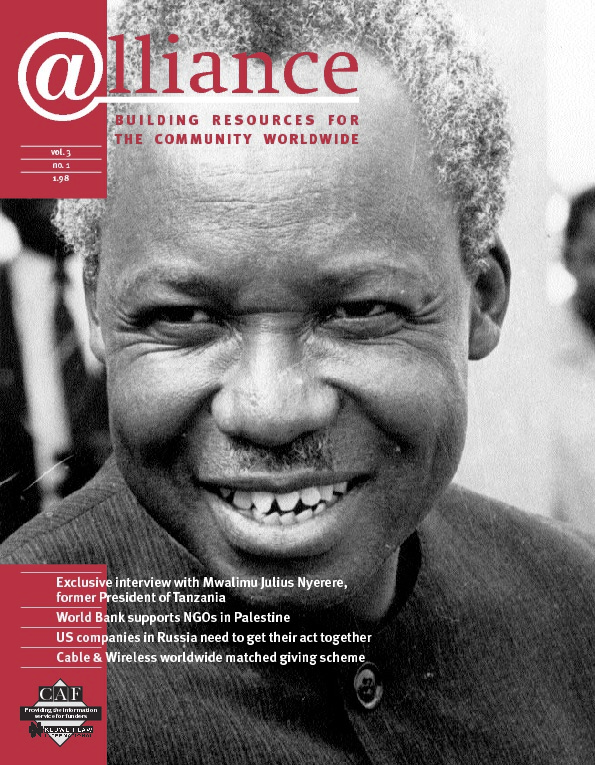‘The role of the World Bank today is not the same role it played 50 years ago when it was formed…Now the World Bank is a flexible institution that realizes the essential need to form partnerships, and is willing to change to make these partnerships a reality.’
Like other international organizations, the World Bank finds itself challenged to remain relevant in today’s global economy. As a consequence, World Bank President James Wolfensohn has sought to reposition the organization’s role in the overall landscape of international economic development. Corporate citizenship and private–public partnerships are important elements of this new approach.
World Bank statistics indicate that in the past seven years the level of global private sector investment has expanded from half the size of official governmental assistance to four times as much. As the private sector has become the principal locomotive for economic development, public institutions like the World Bank have been encouraged by their members to engage the private sector as a partner. Last year, the flow of private capital to developing countries reached a record $244 billion, more than 80 per cent of total flows to developing countries.
A new Corporate Citizenship Program
In response, the World Bank formed a Corporate Citizenship Program in 1996, with two pilot campaigns. Amy Horng, leader of the Program’s Learning Campaign, summarizes the practical relevance of the World Bank’s efforts as follows: ‘When the private sector enters a partnership, there are benefits for the corporations as well as the community.’ In essence, the World Bank views corporate citizenship as a win–win partnership that helps create wealth and stimulate development. Corporate citizenship none the less requires the right catalyst in order to expand globally, and the Bank hopes to act in part as that catalyst, particularly through its corporate citizenship campaigns. Thus, Horng says, ‘The World Bank can serve as a knowledge bank, a broker of know-how and good practices, a connector of interested partners, and a search engine for linking different sectors.’
Among the specific objectives of the Learning Campaign is the creation of a think-tank and a best-practices inventory. A survey of corporate citizenship practices is being compiled through on-site visits, interviews and literature reviews. The Strategic Pilots Campaign is an attempt to build and complement other corporate citizenship efforts, such as the development of an NGO Group, a Foundations Initiative and Voluntary Guidelines.
Testing the approach
The World Bank’s approach was tested and refined in a series of seminars, conferences and roundtables in 1996 and 1997 (including a ‘Corporate Citizenship Day’ at the annual World Bank/IMF meetings), where Bank executives met with distinguished private and foundation leaders. The initial conclusion from this round of consultation was that the private sector was even more strongly involved in promoting development than originally anticipated. It was, however, felt that corporate citizenship should not be viewed as philanthropic effort but rather as a rational and self-interested business strategy which will benefit not only the community but also the business and employees. Another key conclusion was that a new social paradigm was emerging in the global economy, one which involved a three-way partnership between government, business and the community. Strong relationships need to be built between each of the three partners in order to generate the social cohesion and trust necessary for robust and sustainable development.
Three key needs were expressed by the various participants from public, private and civil society organizations:
- a need for knowledge on what corporate citizenship is, and why and how it is expanding;
- lessons on what works;
- training to increase the effectiveness of work on this issue.
The way ahead
In light of the above, the Bank’s Corporate Citizenship Program has set itself the following objectives. First, to learn what works, especially by developing a practical methodology for assessing the impact of corporate citizenship activities. Here, the Bank wishes to achieve a greater level of understanding of the economic forces at work in public–private partnerships. The creation of regulatory and fiscal environments that are conducive to corporate citizenship is another essential step.
The World Bank then intends to disseminate and share the information it has been able to compile, so as to facilitate best practices worldwide. Finally, the Bank wants to engage its own country teams to help bring the corporate world into the development agenda of their respective countries.
The next World Bank regional roundtables on corporate citizenship are scheduled for South Africa in December 1997 and Morocco in early 1998.
Guillermo Jiménez is Head of Division at the International Chamber of Commerce, Paris.
For more information, contact: The Corporate Citizenship Team, FPDVP, 1818 H Street NW, Room F11K-186, Washington DC 20433, USA. Fax: +1 202 522 2961. E-mail: corpcitizen@worldbank.org Website: http://www.worldbank.org/html/fpd/corpcitizen





Comments (0)